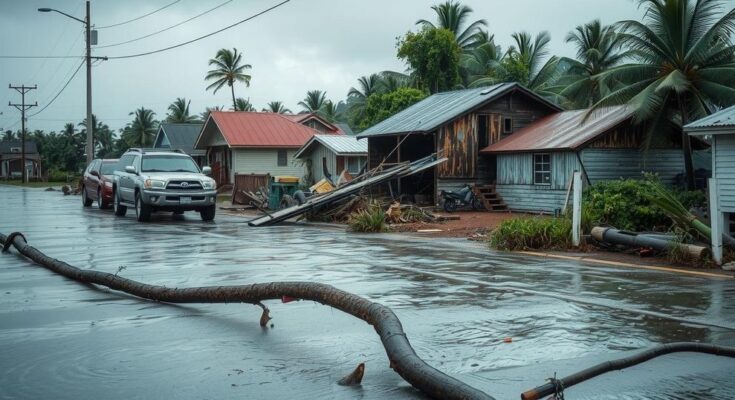Cyclone Chido has caused catastrophic destruction in Mayotte, with authorities fearing a death toll that could reach several thousand. The storm made landfall with winds of 226 km/h and devastating storm surges. Rescue operations are ongoing and complicated by local customs regarding burials. Mayotte remains a region of significant socioeconomic concern, recently highlighted by immigration issues.
Authorities in Mayotte, a French territory in the Indian Ocean, are grappling with a catastrophic toll following Cyclone Chido, which has devastated the island. Despite the official death count currently reported at 14, Prefect François-Xavier Bieuville has indicated that this figure is preliminary and fears the final number may rise to several hundred or even a few thousand. Cyclone Chido, which made landfall with winds reaching 226 km/h (140 mph) and severe storm surges, represents the most powerful cyclone to impact the region in over nine decades. Rescuers, bolstered by emergency personnel from France and the nearby territory of Reunion, are urgently searching for survivors amid the wreckage.
Mayotte, with a population exceeding 321,000, is one of the poorest regions of France, characterized by shantytowns that have been devastated by the cyclone. Many residents, predominantly Muslim, are required by custom to bury their deceased within 24 hours, complicating the process of accurately assessing the death toll. Furthermore, although almost 5,000 miles from Paris, the island’s immigration issues have previously drawn attention, as there has been an influx of asylum seekers from Comoros seeking citizenship in France.
As rescuers continue their efforts in the aftermath of Cyclone Chido, it is evident that the magnitude of the disaster will have lasting impacts on the island, both in terms of human loss and the broader social implications for the community.
Cyclone Chido has emerged as a historic natural disaster for Mayotte, recording wind speeds equivalent to a Category 4 hurricane and exceeding the intensity of storms experienced in the region for nearly a century. The island’s socioeconomic challenges further exacerbate the devastation, as many residents were already living in precarious conditions prior to the cyclone. Additionally, the island’s cultural practices regarding burial may hinder immediate reporting on casualties. National immigration issues have added another layer of complexity, as external pressures concerning asylum seekers have been exacerbated by this disaster.
In conclusion, the impact of Cyclone Chido on Mayotte has resulted in a tragic humanitarian crisis, with the potential death toll expected to escalate significantly from current preliminary reports. Ongoing rescue efforts highlight the urgent need for aid in this impoverished territory, which not only grapples with loss and destruction but also faces underlying social challenges intensified by the disaster. The resilience of the community and the effective response of regional and national authorities will be critical in the recovery process.
Original Source: www.forbes.com




